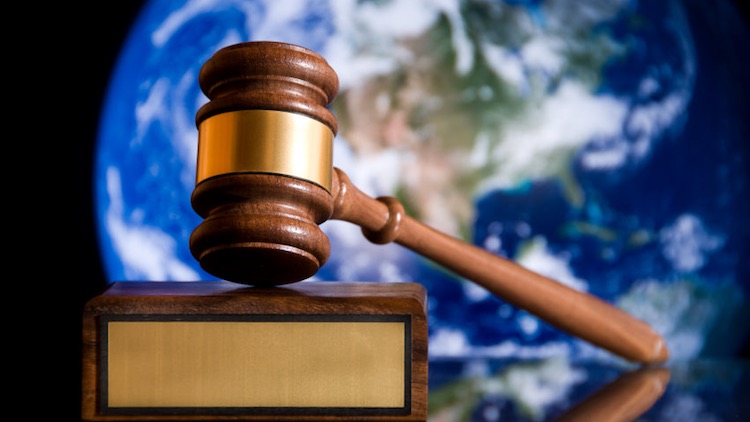Ninth Circuit Clarifies: FTC Common Carrier Carve-Out Is Activity Based

The smarter way to stay on top of broadcasting and cable industry. Sign up below
You are now subscribed
Your newsletter sign-up was successful
A federal appeals court has ruled that the FTC does have authority over the noncommon carrier activities of common carriers, which means that it could, for example, still enforce its unfair and deceptive practices authority over Yahoo! even though it is owned by telco common carrier Verizon.
The case involved AT&T's slowing of data speeds, with AT&T arguing the FTC did not have jurisdiction over its broadband operations (this was before the reclassification of ISPs as common carriers) because the common carrier exemption for its common carrier status as a telecom provider immunized its noncommon carrier activities.
The full appeals court upheld a district court and overruled its own three-judge panel, which had found that the FTC exemption from regulating common carriers was status-based, not activity-based, meaning that the non-common carrier activities of a common carrier would also have been exempt.
That three-judge panel, in overturning the FTC's action against AT&T for throttling the speeds of unlimited data customers, last year ruled that the regulatory exemption that prevents the FTC from regulating common carriers is not confined to common carrier "activity" by an entity that has the status of a common carrier, but to noncommon carrier activity by that entity as well.
The decision helps clear up a jurisdictional issue that would have left some question about the FTC's authority to regulate broadband under the new Restoring Internet Freedom framework.
Related: Ninth Circuit Will Review Panel Opinion on AT&T Mobility
The judge writing the opinion for the full court recognized the gap that would have been created by a status-based interpretation, writing: "This statutory interpretation also accords with common sense. The FTC is the leading federal consumer protection agency and, for many decades, has been the chief federal agency on privacy policy and enforcement. Permitting the FTC to oversee unfair and deceptive non-common-carriage practices of telecommunications companies has practical ramifications. New technologies have spawned new regulatory challenges. A phone company is no longer just a phone company. The transformation of information services and the ubiquity of digital technology mean that telecommunications operators have expanded into website operation, video distribution, news and entertainment production, interactive entertainment services and devices, home security and more. Reaffirming FTC jurisdiction over activities that fall outside of common-carrier services avoids regulatory gaps and provides consistency and predictability in regulatory enforcement."
The smarter way to stay on top of broadcasting and cable industry. Sign up below
The court did not actually rule on the panel's decision, but instead looked at the District Court decision "de novo," meaning independently and as though for the first time, and ruled the court got it right.
The FTC had challenged the Ninth Circuit three-judge panel decision, with most court watchers expecting the full court to overturn the panel, as was the case Monday.
“The Ninth Circuit’s decision is a significant win for American consumers," said FCC chair Ajit Pai. "Among other things, it reaffirms that the Federal Trade Commission will once again be able to police Internet service providers after the Restoring Internet Freedom Order takes effect. In the months and years ahead, we look forward to working closely with the FTC to ensure the protection of a free and open Internet.”
Acting FTC chair Maureen Ohlhausen said: "I welcome the Ninth Circuit’s ruling as good news for consumers. It ensures that the FTC can and will continue to play its vital role in safeguarding consumer interests including privacy protection, as well as stopping anticompetitive market behavior.”
Various net neutrality activists bristled at the suggestion the decision better protected consumers under the new Restore Internet Freedom network neutrality regulation rollback.
“Some have tried to portray today’s decision as somehow lessening the disastrous effects of the FCC’s recent net neutrality repeal. This is entirely backward," said Public Knowledge SVP Harold Feld. "This case illustrates the problem of having the Federal Trade Commission try to do alone what it should do in partnership with the FCC."
Although the court correctly rebuffed AT&T’s blatant attempt to further weaken the FTC’s ability to protect consumers in the digital marketplace, today’s legal victory will do nothing to ensure that ISPs engage in fair network practices," said Center for Digital Democracy executive director Jeff Chester. "Everyone knows the FTC is incapable of protecting Internet consumers. For example, although the FTC is suppose to serve as the nation’s privacy cop, Americans have witnessed a dramatic decline in their ability to control their data. That’s because the industry has been able to significantly expand their commercial data gathering practices knowing that the commission action is not a serious threat. The FTC has also failed to address the growth of Google, Facebook and the other “Big Data” digital giants.
Despite what the FTC may say about ensuring ISPs engage in fair network practices, it will serve as only “network neutrality” window dressing. Long stripped if its ability to enact regulation, the FTC is ultimately incapable of playing a meaningful consumer protection role in the digital era.
Contributing editor John Eggerton has been an editor and/or writer on media regulation, legislation and policy for over four decades, including covering the FCC, FTC, Congress, the major media trade associations, and the federal courts. In addition to Multichannel News and Broadcasting + Cable, his work has appeared in Radio World, TV Technology, TV Fax, This Week in Consumer Electronics, Variety and the Encyclopedia Britannica.

